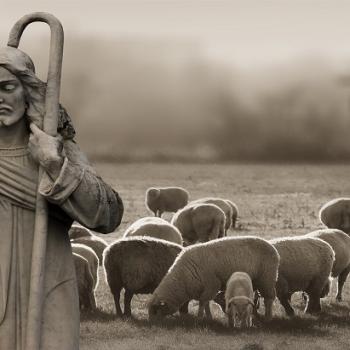The issue of slavery in the Bible is contentious, to say the least. There’s no getting around the biblical passages that outright condone it. Reading opposing verses that condemn “enslavers” (1 Timothy 1:10 [ESV]) makes this matter supremely confounding.
Bible Passages That Condone Slavery
I found a couple of Bible verses that condone slavery on OpenBible.info, which does a great job of giving relevant search results for Bible research. Here are some of the notable passages that condone slavery (parts bolded for emphasis):
“Your male and female slaves are to come from the nations around you; from them you may buy slaves. You may also buy some of the temporary residents living among you and members of their clans born in your country, and they will become your property. You can bequeath them to your children as inherited property and can make them slaves for life, but you must not rule over your fellow Israelites ruthlessly.” (Leviticus 25:44-46)
“If a slave owner takes a stick and beats his slave, whether male or female, and the slave dies on the spot, the owner is to be punished. But if the slave does not die for a day or two, the master is not to be punished. The loss of his property is punishment enough.” (Exodus 21:20-21 [GNT])
Egad.
These verses explicitly refer to other humans as property. Given the language here, I don’t get the impression that they entered into this servitude willingly.
Leviticus 25:44-46 makes a distinction between fellow Israelites and members of surrounding nations. If the enslaved person was a foreigner, they were allowed to be treated as property. That’s…slavery. Plain and simple.
Bible Passages That Condemn Slavery
In contrast, here are Bible verses that condemn slavery, at least on some level:
“If a slave has taken refuge with you, do not hand them over to their master.” (Deuteronomy 23:15)
“Is not this the fast that I choose: to loose the bonds of wickedness, to undo the straps of the yoke, to let the oppressed go free, and to break every yoke?” (Isaiah 58:6)
“Were you a slave when you were called? Don’t let it trouble you—although if you can gain your freedom, do so.” (1 Corinthians 7:21)
1 Corinthians 7:21 urges those who have the chance to claim their freedom to seize it. And I was stunned when I read Deuteronomy 23:15, which decries returning runaway enslaved people to their enslavers. I highly doubt that this straightforward verse was obeyed during the peak of slavery in America.
Analyzing “Cross Examined “‘s Take on Slavery in the Bible
I found this video by Cross Examined on YouTube that addresses how slavery is handled in the Bible (I had to stick with hyperlinking to it, for some reason, WordPress isn’t letting me properly embed the video in this post). Here’s a transcript of some of what Frank Turek spoke on the topic:
“First of all, Old Testament slavery was not race-based for servitude like we think about slavery in the United States 150 years ago. It was a voluntary means of working off debt or keeping captives from mustering a rebellion, which is what we still do. It’s called ‘Gitmo’ (note: this is a shortened name for Guantanamo Bay) in this country, we put captives there.
So, the kind of slavery that we’re thinking about when we read the Bible is not the kind of slavery that was in the Old Testament. This was called ‘indentured servitude’, and it actually benefited the servant. If there’s one particular place that the King James gets it exactly right, is they translate the word in the Old Testament, not as ‘slave’ but ‘servant’. Which is the way it should be translated.
Secondly, slave trading is condemned in both the Old Testament and the New Testament, and it’s punishable by death in the Old Testament.
So the kind of slave trading we had in America, if we were living by biblical values, we would have executed slave traders.”
–Frank Turek, “SLAVE TRADING PUNISHABLE BY DEATH in the Bible! � NO WAY!!!”
The Bible Verse Ignored by All Slavers
Turek is correct in saying that slave trading is punishable by death in the Old Testament:
“Whoever steals a man and sells him, and anyone found in possession of him, shall be put to death.” (Exodus 21:16)
I found this article on the issue of slavery in the Bible that confirms how this verse was conveniently ignored by so many enslavers. If Christians in the age of the slave trade had truly followed the Bible literally, then everyone who kidnapped people for enslavement or owned them would’ve been put to death for their act of cruel injustice.
I am concerned with how other Christians handle this matter when they argue that all mentions of slavery in the Bible are “actually” another form of indentured servitude. Unfortunately, the verses above, especially Exodus 21:20-21, describe unwilling people being violently abused and treated as property.
While it’s probably fair to say that not every part of the Bible mentioning enslaved people/servants parallels the horrific slave trade, there’s no doubt that some verses either condone or encourage treating others as subhuman property.
And I feel conflicted about what Turek said, about slave trading being biblically condemned. Is this still true in light of Leviticus 25:44-46 openly approving the purchasing of enslaved people from neighboring nations?
Christian Snideness Against Fair Questions
In the comments section of Cross Examined’s video, I found this comment accusing another commenter of taking Exodus 21:20-21 out of context:

“So you found Exodus 21:20-21. But did you read it in context? When read after Exodus 21:18-19, you’ll see it as it is really meant…..unless your agenda is simply to stand against The Bible. If truth is your goal, your perspective will always be made sharper with context.”
Exodus 21:18-19? Friends, those preceding verses have nothing to do with this topic:
“If people quarrel and one person hits another with a stone or with their fist and the victim does not die but is confined to bed, the one who struck the blow will not be held liable if the other can get up and walk around outside with a staff; however, the guilty party must pay the injured person for any loss of time and see that the victim is completely healed.” (Exodus 21:18-19)
These verses discuss quarreling, not whether or not it’s ok to violently beat an enslaved person. Oh, and it’s absolutely repugnant that a slave wouldn’t be paid for violence committed against them, but in the case of a quarrel, the injured person would be.
This commenter falsely accused his fellow of “not wanting the truth” and having an agenda of “standing against the Bible”. Not only did he not provide relevant context to refute the ugly language in Exodus 21:20-21, but he also resorted to fallacies as a retort.
This comes across as gaslighting to me. At any rate, it’s a shameful way to handle this topic.
Connotation Issues With “Slave” and “Servant”
I know that it’s ironic for me to say this as somebody who studied English at college, but I despise the English language. In my opinion, we have too many ways to say different things/meanings. And some words get blended together interchangeably when they mean entirely other things.
The words “slave” and “servant” should never be treated like they mean the same thing. This shares a similar issue with different versions of the Bible using “Sheol”, “Gehenna”, and “Hades” interchangeably to use for “Hell”.
It really bothers me that prominent Christian speakers and leaders try to argue that the primary/only form of slavery in the Bible is comparable to indentured servitude. After all, Joseph in the Book of Genesis was sold into slavery by his brothers. Even though he, thankfully, reached a better place after his tribulations, he still started as an unwilling enslaved person.
Looking at the Word “Bondservant”
I found this article that mentions the word “bondservant”, which the article argues more accurately fits the Biblical definition of slavery.
This is a case where I’m glad to have an ESV (English Standard Version) Bible on hand. I looked up how this Bible version handles the word “bondservant” compared to other versions. Titus 2:9 is probably the best example.
Here’s how the verse is translated in four different Bible versions:
“Bondservants are to be submissive to their own masters in everything; they are to be well-pleasing, not argumentative,…” (Titus 2:9 [ESV])
“Teach slaves to be subject to their masters in everything, to try to please them, not to talk back to them,…” (Titus 2:9 [NIV])
“Exhort servants to be obedient unto their own masters, and to please them well in all things; not answering again;” (Titus 2:9 [KJB])
“Exhort bondservants to be obedient to their own masters, to be well pleasing in all things, not answering back,…” (Titus 2:9 [NKJV])
Merriam-Webster defines the word “bondservant” as “one bound to service without wages”. They list it as a similar word to “slave”, and I can see why. I can also see this being similar to “indentured servant”, but only if used to indicate a genuinely free-will choice to serve.
“Bondservant” in Colossians 4:1
A couple of Bible versions also use the word “bondservant” in Colossians 4:1:
“Masters, treat your bondservants justly and fairly, knowing that you also have a Master in heaven.” (Colossians 4:1 [ESV])
“Masters, provide your slaves with what is right and fair, because you know that you also have a Master in heaven.” (Colossians 4:1 [NIV])
“Masters, give unto your servants that which is just and equal; knowing that ye also have a Master in heaven.” (Colossians 4:1 [KJB])
“Masters, give your bondservants what is just and fair, knowing that you also have a Master in heaven.” (Colossians 4:1 [NKJV])
Another Instance of “Bondservant” in 1 Timothy 6:1
Yet again, there’s a discrepancy with word choice across various translations of 1 Timothy 6:1:
“Let all who are under a yoke as bondservants regard their own masters as worthy of all honor, so that the name of God and the teaching may not be reviled.” (1 Timothy 6:1 [ESV])
“All who are under the yoke of slavery should consider their masters worthy of full respect, so that God’s name and our teaching may not be slandered.” (1 Timothy 6:1 [NIV])
“Let as many servants as are under the yoke count their own masters worthy of all honour, that the name of God and his doctrine be not blasphemed.” (1 Timothy 6:1 [KJB])
“Let as many bondservants as are under the yoke count their own masters worthy of all honor, so that the name of God and His doctrine may not be blasphemed.” (1 Timothy 6:1 [NKJV])
What’s With These Word Choices?
It interests me that the NKJV also uses “bondservant” instead of “slave” or “servant” in these verses. Out of curiosity, I looked up the history of this version on Bible Gateway. They say that the NKJV was made with “unyielding faithfulness” to the original languages of the Bible. Hmm.
Well, perhaps it’s true then that “bondservant” was the term used for what we would objectively call “indentured servitude”. However, it’s incorrect to say that this definition applies to/erases the blatant slavery language in the Old Testament verses discussing the purchasing and abusing of enslaved people.
This was an uncomfortable look at how slavery was handled in Biblical times. I think it’s time to look at how these verses were used in the 18th and 19th centuries when slavery was (for godless reasons) widely justified.
The History of Slavery and Forced Evangelization
During my research, I found this article by Learn Religions that addresses the history of slavery and Christianity. What a nightmare.
They quote an Anglican speaker from the 18th century named Edmund Gibson, who stated that Christianity frees from sin’s bondage, not earthly bondage (Cline). Isn’t slavery one of the most disgusting sins known in our history? At least, that’s what John Wesley (yay Methodism!) said about the matter.
The article from Learn Religions notes that enslaved people in America were warned that, per those verses in the Bible about obeying masters, them disobeying their owners would displease God (Cline). Those owners were absolute hypocrites who conveniently ignored Colossians 4:1.
Likewise, nobody cared about Exodus 21:16, which Frank Turek is right about stating that both enslavers and those who kidnapped them deserve to be put to death.
Xe’ra and Illidan: An Analogy for Forced Faith
Behold, a cinematic analogy for forced Evangelization from World of Warcraft, where this game’s version of an angel tries to force an anti-hero to “embrace the Light”:
It’s hard for me to pity Xe’ra when she had no qualms about violating Illidan’s free will. After all, coming to faith is supposed to be a choice made without any coercion or threats otherwise.
Out of the research for this post, I’ve learned more about Christians forcing vulnerable people to either “choose” Christianity or suffer godless consequences. I’ve also learned that some Christians tried to prevent enslaved people from joining the faith out of fear that their becoming Christians would undermine the slave-based economy.
Shameful.
Contradictions
My takeaway from all of this is that outright slavery and what we’d call “indentured servitude” are both condoned in the Bible. There’s blatant evidence that enslaving people out of neighboring nations was acceptable in the Old Testament, though I’m not sure this was echoed in the New Testament.
I’m grossed out that other Christians out there openly mock and deride those of us who are reasonably upset and angry over this matter. What reasonable person wouldn’t be enraged over the Bible being used to justify this sin?
Addressing these discrepancies and issues in the Bible doesn’t mean that we’re angry with God. Far from it. We’re angry with how humans have interpreted and applied these passaged to justify committing sins against fellow humans across the centuries.
The Bible is divinely inspired, a compilation of writings from many different authors. As such, I personally consider it dangerous to ignore the possibility of these human writings being given authority over who we all know God to be.
God is love, and there’s nothing loving about forcing somebody against their will to serve you and get treated as property. As alarming as I know this is to read for some, I’m now wondering if the authors of those quotes from Leviticus and Exodus were truly speaking for God or merely espousing a common (but vile) social norm in those days around the world.
Christians need to treat this matter with seriousness and take care that they don’t come across as defending slavery in their efforts to promote apologetics. Let’s be honest: why would any non-Christian want to draw closer to God if they have reason to believe that some of us are making excuses for inhuman acts of cruelty in the Bible?
Citations
Cline, Austin. (2021, February 16). Slavery and Racism in the Bible. Retrieved from https://www.learnreligions.com/the-bible-race-and-slavery-3893539
Merriam-Webster. (n.d.). Bond servant. In Merriam-Webster.com dictionary. Retrieved August 5, 2022, from https://www.merriam-webster.com/dictionary/bond%20servant
Featured Image by LeoNeoBoy/Pixabay
Hello, and thank you for supporting my work here on Patheos! If you’d like to support me further, please feel free to “Buy Me A Coffee” here:












